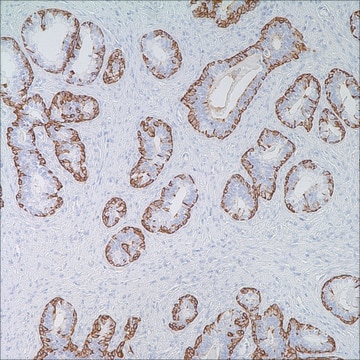MAB8121
Anti-Cytomegalovirus Antibody, blend, clone 8B1.2, 1G5.2, and 2D4.2
Chemicon®, from mouse
Synonyme(s) :
CMV
About This Item
Produits recommandés
Source biologique
mouse
Niveau de qualité
Forme d'anticorps
purified immunoglobulin
Type de produit anticorps
primary antibodies
Clone
1G5.2, monoclonal
2D4.2, monoclonal
8B1.2, monoclonal
Espèces réactives
human
Fabricant/nom de marque
Chemicon®
Technique(s)
immunofluorescence: suitable
immunohistochemistry: suitable
Isotype
IgG2a
Conditions d'expédition
wet ice
Spécificité
With CMV the antigens expressed at different times are listed as:
Immediate Early (alpha gene expression): those antigens expressed at 3-12 hrs post-infection generally involved in Transcription such as 72kD major phosphoprotein and a few other other antigens at 60 - 80kD.
Early Antigen (beta genes) a.k.a. Delayed Early or Intermediate Early: expressed at 12-24hrs post-infection. Generally enzymes and one virion structural gene preceding viral DNA synthesis.
Late Antigen (gamma genes): expressed at 36-48hrs post-infection. Generally structural proteins. Major protein = 55kD
Immunogène
Application
Immunofluorescence
Optimal working dilutions must be determined by the end user.
Forme physique
Stockage et stabilité
Informations légales
Vous ne trouvez pas le bon produit ?
Essayez notre Outil de sélection de produits.
En option
Code de la classe de stockage
10 - Combustible liquids
Classe de danger pour l'eau (WGK)
WGK 2
Point d'éclair (°F)
Not applicable
Point d'éclair (°C)
Not applicable
Certificats d'analyse (COA)
Recherchez un Certificats d'analyse (COA) en saisissant le numéro de lot du produit. Les numéros de lot figurent sur l'étiquette du produit après les mots "Lot" ou "Batch".
Déjà en possession de ce produit ?
Retrouvez la documentation relative aux produits que vous avez récemment achetés dans la Bibliothèque de documents.
Notre équipe de scientifiques dispose d'une expérience dans tous les secteurs de la recherche, notamment en sciences de la vie, science des matériaux, synthèse chimique, chromatographie, analyse et dans de nombreux autres domaines..
Contacter notre Service technique




